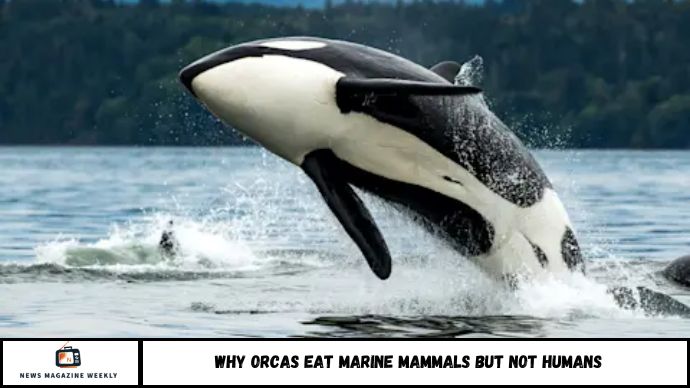Orcas also known as killer whales are apex predators feared across the oceans. They’ve been seen hunting sharks, seals, and even whales larger than themselves. So why is it that despite their fearsome name and hunting prowess, attacks on humans are nearly non-existent in the wild?
Orcas, or killer whales, have recently made waves literally and figuratively by ramming and even capsizing boats off the coasts of Spain and Portugal.
While no humans have been injured in these unusual encounters, the incidents sparked renewed fear and fascination. If these powerful marine predators can sink a yacht, what might they do to a person? After all, orcas are apex predators, equipped with sharp intelligence and the muscle to take down everything from seals to sharks.
But here’s the surprising truth: despite their dramatic name and brutal hunting methods, wild orcas almost never attack humans.
Just as great white sharks tend to prefer fat-rich seals over lean humans, killer whales appear to have little interest in adding us to their diet. Their prey choices are driven by biology, behavior, and years of evolution—not aggression for aggression’s sake.
In this article, we’ll explore:
- Why orcas target marine mammals
- The behavioral and biological reasons they avoid humans
- What science and statistics tell us
- How their intelligence shapes their diet and social behavior
- FAQs and safety takeaways about orcas and humans
Understanding Orcas’ Diet: Apex Predators With Selective Taste
Orcas are not indiscriminate killers. In fact, they are among the most strategic and selective hunters in the animal kingdom.
Types of Orcas and Their Diets
Scientists have identified several ecotypes of orcas, each with distinct hunting preferences:
- Resident orcas: Eat mainly fish, especially salmon
- Transient (Bigg’s) orcas: Specialize in hunting marine mammals like seals and dolphins
- Offshore orcas: Believed to hunt sharks and large fish
Fun Fact: Some transient orcas have been seen using coordinated attacks, beaching themselves temporarily to snatch seals.
Why Don’t Orcas Hunt Humans?
Despite their predatory abilities, no fatal orca attacks on humans have ever occurred in the wild.
Key Reasons Include:
- Humans are not part of their evolutionary diet
- Orcas have evolved over millions of years hunting species in the ocean—not land mammals.
- Lack of interest or confusion
- A few rare non-lethal incidents suggest curiosity, not aggression.
- High intelligence and social learning
- Orcas can distinguish between different species and learn behaviors from their pod. Aggression toward humans is not part of that learning.
Stat Check: According to the Whale and Dolphin Conservation, there are no verified reports of wild orcas killing a human, compared to thousands of marine mammal kills each year.
Intelligence and Social Behavior: Orcas Know Better
Orcas are among the most intelligent animals on Earth. Their large brains, complex communication, and tight-knit pods indicate social intelligence that rivals primates.
Social Structures Prevent Rogue Behavior
- Young orcas are taught how and what to hunt
- Group ethics and traditions strongly influence individual behavior
- Attacking unfamiliar species (like humans) is discouraged or ignored
Captive Orcas vs. Wild Orcas: A Dangerous Distinction
While wild orcas rarely interact aggressively with humans, captive orcas have attacked trainers, sometimes fatally.
Why the Difference?
- Stress and confinement affect mental health
- Captive orcas often display abnormal behavior not seen in the wild
This further supports the idea that wild orcas choose not to harm humans—unless severely provoked or psychologically damaged in captivity.
FAQs
1. Have orcas ever eaten a human?
No, there are no confirmed reports of a wild orca ever eating a human.
2. Why are orcas called “killer whales”?
The name comes from their hunting skills—not because they kill humans.
3. Can orcas distinguish humans from prey?
Yes, orcas can identify species and seem to consciously avoid attacking humans.
4. Are orcas dangerous to swimmers or divers?
In the wild, they typically ignore humans or show mild curiosity.
5. What do orcas usually eat?
Depending on the ecotype: fish, seals, sea lions, dolphins, and even sharks.
6. Are captive orcas more dangerous?
Yes. Stress and confinement can lead to aggression not seen in wild orcas.
Conclusion
Orcas may dominate the food chain, ruthlessly hunting everything from seals to sharks. But when it comes to humans, they show a surprising level of restraint—even curiosity and tolerance.
Whether it’s their evolutionary history, social intelligence, or lack of interest, orcas have simply never included us on the menu.

